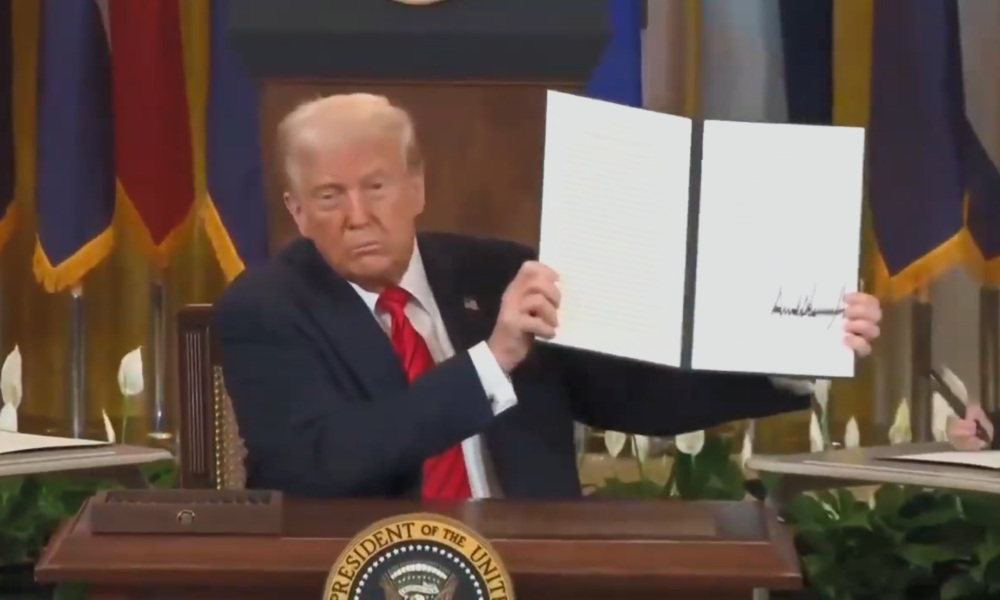Politics
Trump signs new travel ban affecting nearly 20 countries

President Donald Trump signed a presidential proclamation instituting a new travel ban that blocks or restricts entry from nearly 20 countries, citing national security concerns and deficiencies in vetting and identity-management systems.
The new proclamation, signed on Wednesday, imposes full travel bans on nationals from the following 12 countries: Afghanistan, Burma, Chad, Republic of the Congo, Equatorial Guinea, Eritrea, Haiti, Iran, Libya, Somalia, Sudan, and Yemen. In addition, partial restrictions are placed on Burundi, Cuba, Laos, Sierra Leone, Togo, Turkmenistan, and Venezuela.
“Absent the measures set forth in this proclamation, the immigrant and nonimmigrant entry into the United States of persons described […] would be detrimental to the interests of the United States,” Trump stated in the order, which is set to take effect at 12:01 a.m. EDT on Monday, June 9.
The proclamation cites the Immigration and Nationality Act as the basis for the suspensions, arguing that the countries listed have failed to meet U.S. standards for screening, vetting, and cooperation in sharing identity or criminal information. It also notes high visa overstay rates and limited ability or willingness to repatriate their nationals as contributing factors.
“The United States must ensure that admitted aliens […] do not bear hostile attitudes toward its citizens, culture, government, institutions, or founding principles,” the proclamation states. It also asserts that some countries have “taken advantage of the United States in their exploitation of our visa system.”
The order directs the Secretaries of State and Homeland Security, in coordination with intelligence agencies, to monitor compliance and recommend updates every 180 days. Countries affected by the ban may work with U.S. authorities to improve their information-sharing systems and potentially be removed from the list over time.
This is the most expansive travel ban enacted by Trump since the original 2017 executive order targeting several Muslim-majority nations. That earlier policy, after legal challenges and revisions, was upheld by the U.S. Supreme Court in 2018.
Unlike the 2017 version, the new ban includes case-by-case waivers and categorical exceptions, such as for lawful permanent residents, dual nationals traveling on a passport from a non-banned country, certain special visa holders, and humanitarian cases.
The new travel ban comes in the wake of the antisemitic firebombing attack in Boulder, Colorado, which left 15 people injured. According to CNN White House reporter Alayna Treene, one official said the president had been weighing new restrictions for weeks, but the Boulder attack accelerated the decision.
The proclamation also instructs the State Department to review the vetting practices of Egypt, the home country of the Boulder suspect, though it is not currently included on the ban list.

-

 World6 days ago
World6 days agoEthiopian volcano erupts for first time in thousands of years
-

 Legal3 days ago
Legal3 days agoUtah Amber Alert: Jessika Francisco abducted by sex offender in Ogden
-

 US News2 days ago
US News2 days agoExplosion destroys home in Oakland, Maine; at least 1 injured
-

 Health3 days ago
Health3 days agoMexico’s September human bird flu case confirmed as H5N2
-

 Legal1 week ago
Legal1 week agoSuspect in San Diego stabbing shot by authorities after fleeing into Mexico
-

 Health1 week ago
Health1 week agoMarburg virus outbreak in Ethiopia grows to 6 confirmed cases
-

 World3 days ago
World3 days agoWoman killed, man seriously injured in shark attack on Australia’s NSW coast
-

 World1 week ago
World1 week agoU.S. sanctions companies and vessels accused of aiding Iranian military oil sales



